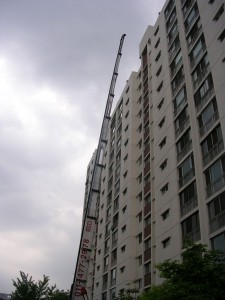A 45-year-old South Korean man allegedly killed his two upstairs neighbors during the hectic Lunar New Year holiday weekend in Seoul, South Korea because he complained that the pair were too noisy.
According to published reports [1] [ko], the man, whose last name is Kim, had regularly made complaints about the noise coming from upstairs. On February 9, 2013, his anger exploded, and he allegedly attacked the two victims, who were trying to calm him down.
Noise complaints from residents of apartment complexes have skyrocketed, with 7,021 cases in 2012, nearly 20 times more than the previous year, according to the South Korean Ministry of Environment. More than half of the Korean population live in apartments, according to 2010 Korea Statistics [2], and in five new bedroom communities outside Seoul, where real estate prices have surged, the number of residents living in apartments reaches more than 80 percent.
The alleged murder in Seoul caused South Koreans to take a closer look at the failings of the South Korean real estate industry as well as the reason why some are so quick to turn to violence over trivial matters.

South Korean apartment building. Photo by Flickr user NEIC. (CC BY-NC-ND 2.0)
Twitter user @managak [3] [ko] lamented the inability of some South Koreans to deal with disputes over noise with civility, pointing to an overwhelmingly stressful society as the cause:
@managak [3]: 층간소음때문에 살인이 났단다. 예전에 공중전화를 오래쓴다고 살인이 벌어진 적도 있었다. 사건을 단순하게 보고 농담거리로 희화하는 것은 아닐까? 지속적인 스트레스로 불안한 정신상태에, 서로 갈등하고 억눌려있던 감정이 사소한 계기에 폭발했다고 봐야지.
@managak [3]: A man killed his neighbors because of the apartment noise nuisance. Some time ago, another murder was committed because the victim had occupied a public phone booth for too long. Have we over-simplified these crimes and made them into laughing stocks? It should be understood as an explosion of suppressed emotions triggered by one tiny thing and an event caused by unstable minds suffering from incessant stress.
Another Twitter user @actwalk [4] [ko] wrote that the real estate industry's culture of bribery helped to make the noise problem in apartment buildings unbearable:
@actwalk [4]: 시스템 부실이 개인 책임으로 환원되는 대표적 사례가 층간소음인 듯 싶다. 건설사와 시행사들이 먹는 돈 좀만 줄이면 층간소음 문제는 상당부분 해결됐을텐데…
@actwalk [4]: As a matter of fact, the real murderer is the shaky social system. If we could cut down on the bribe money construction companies get, then the apartment noise nuisance problem would have been alleviated to a substantial extent.
A user on South Korean Internet portal Daum Agora, under the name The Horizon of Events, criticized [5][ko] Korean construction companies’ proclivity for bribes. His post entitled “Everything About the Apartment Noise Nuisance” has been read more than 56,508 times:
사실 층간소음 문제는 과거에도 계속 제기되어왔던 문제이고, 이미 10여년전에 우리나라 아파트의 낮은 방음성능이 문제가 되어 관련 규제안이 추진되었으나 건설사들의 이익을 대변하는 국토해양부의 미온적인 태도로 실효성 없는 규제안만 마련되었습니다. […] 10여년전에 환경부와 시민단체에서는 중량 충격음 45데시벨 수준의 강력한 규제를 원했으나 국토해양부(그 당시는 건교부)에서는 반대하였고, 결국 50데시벨로 올라가게 되었으며 표준바닥구조라는 희한한 규제안을 만들어 건설사들에게 면죄부를 주었습니다.
In fact, the apartment noise nuisance problem was raised about a decade ago. Back then, a bill regulating the use of low-quality soundproof materials was proposed. However, that bill was downgraded to nominal regulations due to lukewarm reactions of the Ministry of Land, Transport, and Maritime Affairs who choose to stand for the construction companies’ benefit.[…] The Environment Ministry and civic groups originally proposed the noise cap of 45 decibel level, which is a strong measure, but the Ministry of Land, Transport and Maritime Affairs (at that time, the Ministry of Construction and Transport) rose this bar to 50 decibel. Furthermore, they came up with this weird regulation called ‘Standard Floor Structure regulation’ to give excuses to the companies (to continue their sloppy soundproofing construction work).
Furthermore, the author pointed out that the obsession that South Koreans have with real estate investment has contributed to the problem:
어느 나라나 투기꾼은 존재하지만, 한국은 전국민이 투기꾼입니다.이러니, 집이 생활의 도구가 아닌 투기꾼에 의한, 투기꾼을 위한 것이 되고 말지요. 건설사, 정부에게도 책임이 있지만 투기에 환장한 국민들에게도 책임이 있다는 것이지요. 수십만원 밖에 안 하는 핸드폰, TV에 조금의 문제라도 생기면 환불 요구하고 난리를 치면서 수억원을 호가하는 아파트 자체의 품질에는 무관심한 소비자들이 많습니다. 핸드폰 살 때, CPU의 속도는 어느 정도인지, LCD 해상도는 몇 인지 스펙을 꼼꼼히 따져보는 사람은 많아도, 아파트 구입시에는 방음 성능이 어떻게 되는지 꼼꼼히 따져보는 사람은 거의 없습니다 […] 대충 마구잡이로 지어도 비싸게 잘 팔리는데, 건설사들이 미쳤다고 품질에 신경쓰면서 시공합니까? 게다가, 아파트에 심각한 하자가 발생해도, 집 값 떨어진다고 그 것을 공론화하지 않고 쉬쉬하는 입주자들이 수두룩합니다.
There are speculators everywhere worldwide. However, I would say every South Korean is speculator. House is no longer a necessity for living, but an object of speculation, for speculators. Undoubtably, construction companies and the government are to blame, but citizens are also responsible for this mess. When people buy a new cellphone and TV, they usually check every detail from the CPU to LCD resolution. However, when they buy an apartment, they don't care whether it was built with sufficient sound-proofing materials […] Since the poorly built apartments are sold so successfully, the construction companies don't need to care about the quality. Plus, there are so many residents who even after detecting serious construction flaws in their building, never make them public and keep silent on the matter because it could drive their housing prices down.